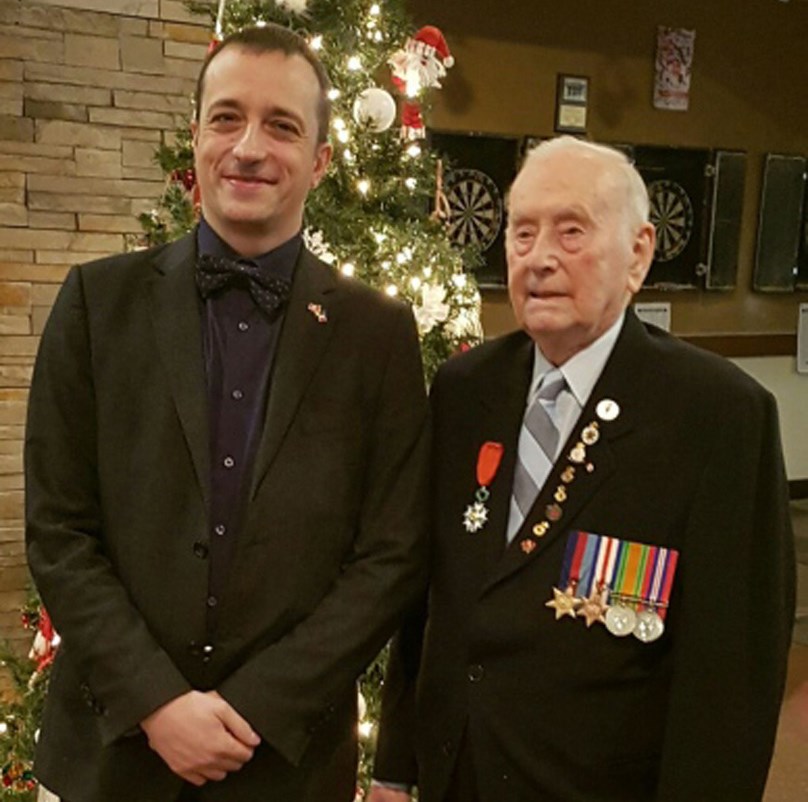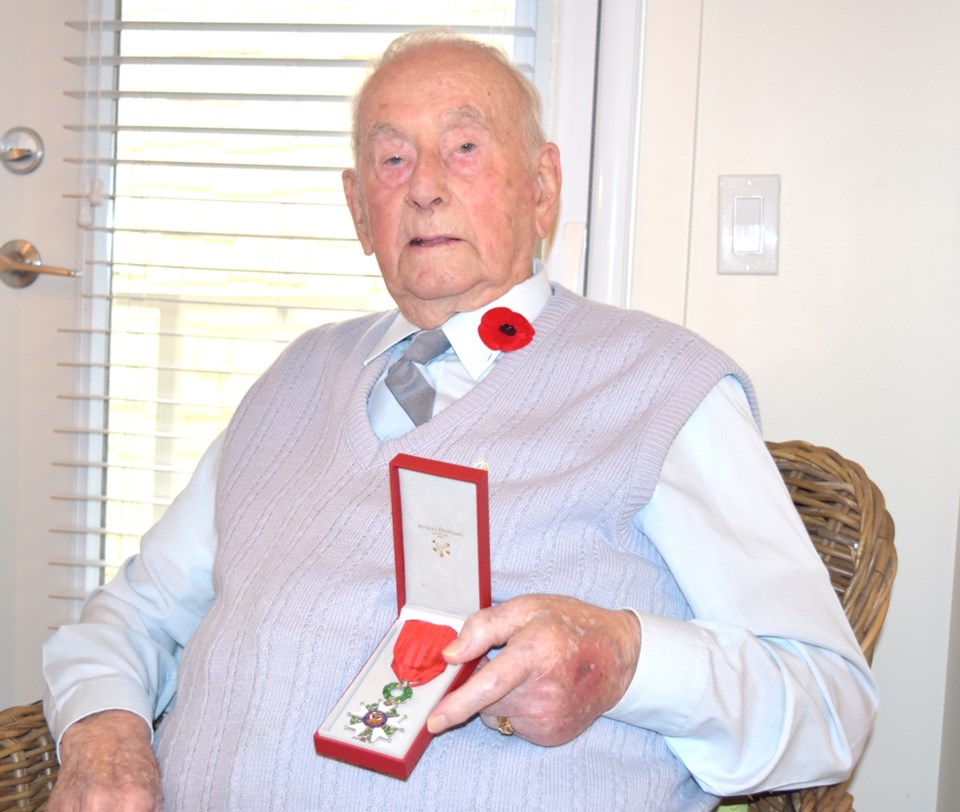Richmond’s oldest D-Day veteran, Len Rigg, has died at the age of 101.
Rigg, who was among the tens of thousands of Allied troops who stormed the beaches of occupied France in June 1944, passed away peacefully at Richmond Hospital on Aug. 11.
In several interviews over the years with the Richmond News, Rigg -who lived most of his latter years at the Maple Residences in Steveston - told of being loaded onto a train as a 28-year-old to the south coast of England with other young servicemen.
Upon arrival, they boarded boats to cross the English Channel and land on the heavily defended beaches of Normandy.
Rigg’s group headed to Arromanches-les-Bains – code-named Gold Beach — where the occupying German forces were waiting to unleash the full fury of war on them.
The task on that day for Rigg, who was in the British Army’s Corps of Royal Engineers, was to help clear mines so the forces could land and get enough of a foothold to advance and break through the German defences.
He was one of the fortunate ones to survive amid the harrowing losses suffered during the attack and he later made his way across Europe and was among the Allied Forces to take part in a victory parade in Berlin, once the war had ended.
However, it wasn’t until a lifetime later that Rigg received recognition for his efforts in the war.
Thanks to his family in Richmond, Rigg, on his 100th birthday in December 2016, received the Legion of Honour medal from the Consul General of France, Jean-Christophe Fleury, in a special ceremony surrounded by family and friends at ANAF Unit 284 in Steveston.

“It was a great day…”said Rigg at the time. “It was nice to get the recognition. And to have so many people there, that was special.”
The medal is awarded in recognition of personal involvement in the liberation of France during the Second World War.
Rigg’s family applied for the medal about two years prior after learning about a ceremony in Downtown Vancouver by the French and Dutch governments, who were recognizing other veterans who helped liberate their countries.
“I am very proud and honoured of my father…” said Kathleen Walters at the time, one of Rigg’s five children.
In 1956, Rigg and his late wife, Kathleen, decided to move their young family to Canada when the cotton industry died down in Lancashire, England, taking with it much of the associated jobs.
They ended up settling on Yellowknife because he had lined up a job there. But after two months, he headed for the Lower Mainland and settled in Richmond in 1962.
Rigg is survived by three daughters and two sons. He had 10 grandchildren and four great grandchildren.
His family is holding a celebration of life on Saturday, Sept. 8 at 4 p.m. at Admirals Walk, 7631 Steveston Hwy.
In lieu of flowers, donations can be made to the Salvation Army Hospice, 6460 No. 4 Rd.
Rigg told the News a few years ago how he recalled the train he was in just prior to D-Day stopped about 15 yards from a small armada of troop-carrying landing craft at the wharf that would ferry Rigg and his fellow soldiers across the English Channel.
“They had locked the rear door of the train, so there was only one way out and that was towards the boats. There was no escape,” he laughed.
Prior to boarding the boats, each of the soldiers was given a shoebox-sized, cardboard container that was filled with rations designed to last 24 hours. Among the items inside was a special tin of Campbell’s Soup.
“You’d never believe this, and I’ve never seen it since. But in the middle of the tin was a candle. You lit it, and by the time it burned down to the bottom it was ready to eat,” Rigg said, adding it didn’t make the soup too hot, but enough to make it palatable.
“I thought it was a great idea and that after the war you’d see that everywhere,” he said. “But I never saw another one.”
Crossing the English Channel was incident-free as the waters were relatively calm. But when they landed on the beaches of Arromanches-les-Bains, Normandy, the full fury of war was unleashed on them.
“The first guy I saw get killed just before we got off the boat was a dispatch rider (messenger) on a motorbike,” he said.
“He was riding across the sand on the beach and all of a sudden he went straight up in the air, both him and the bike. He had hit a mine.”
Rigg knew a thing or two about the dangers of mines. Originally, he was assigned to a Bailey (pontoon) bridge unit.
But once he had finished his training, he became ill and was in hospital for two weeks. When he emerged, he was sent to another unit as a mine-layer and clearer. That was to be his task on D-Day.
“When I discovered that, I thought to myself, what have I done now,” he said. “On my way over on the boat, I thought to myself that I’ll never see England again.”
But he did. He survived D-Day and was among the Allied Forces to take part in a victory parade in Berlin, once the war had ended. “All the big shots were there,” he said, “Stalin, Churchill and Montgomery.”
With files from Philip Raphael/Richmond News



